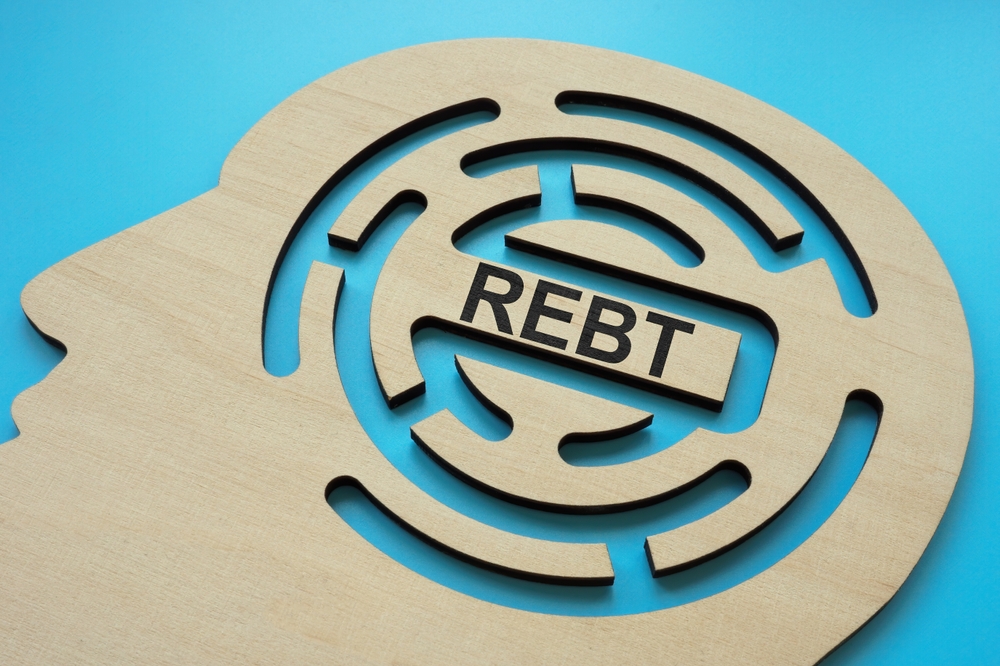Reading Time: 6 minutes

Rational Emotive Behavioral Therapy (REBT) is a form of psychotherapy that can help you change harmful thoughts and beliefs by challenging them. It’ll also help you improve your emotional and mental wellness. This, in turn, increases your interpersonal effectiveness.
Despite what your grandma might have told you, you’re not what you eat. Rather, “you are what you think.” Thoughts and the feelings and beliefs that go along with them shape your reality by influencing your behaviors and actions.
You’ll be less likely to feel good about yourself if you regularly have irrational and maladaptive thoughts. You’ll end up unwittingly sabotaging yourself and you won’t have the confidence to take the kinds of positive actions that lead to a better and happier life.
Created by psychologist Albert Ellis in 1955, The REBT approach derives from cognitive behavioral therapy (CBT) which is today one of the most popular counseling techniques. CBT is commonly used to treat anxiety, depression, substance use disorder, and many other mental health conditions.
Both CBT and REBT work to change automatic, dysfunctional thoughts and beliefs that lead to self-destructive behaviors. But whereas CBT focuses mainly on changing conscious thought patterns, REBT also promotes emotional balance and emotional regulation. This includes controlling anger and impulsivity.
Who Can Benefit From REBT?
REBT has been shown to be effective in treating individuals with:
Anxiety: REBT can reduce symptoms in individuals with generalized anxiety disorder. It’s also been shown to reduce frustration.1
Depression: The approach has been linked to a long term reduction in clinical depression symptoms in recent studies.2
Low self-esteem: The approach has been shown to improve self esteem by altering erroneous, self sabotaging beliefs that caused negative self perceptions.3
Anger and frustration: REBT reduced anger and increased happiness levels in study participants by teaching them how to consciously disrupt irrational beliefs and use imagination exercises to encourage more positive ways of thinking and acting.1,4
Unhealthy Coping Strategies: The approach has been successfully used with athletes learn to change their emotional responses and react to failure and misfortune in healthier ways.5
Stress: REBT significantly reduced stress in research on student participants by teaching them how to identify and alter irrational thoughts and beliefs. The effect remained significant at the study follow-up.6
You can also learn to use REBT techniques as a self-help tool outside of therapy. It’s ideal for anyone who wants to develop a more positive and resilient mindset.
Key Concepts of REBT
REBT is based on the idea that your thoughts and beliefs can be the underlying cause of emotional distress and dysregulation. These feelings are believed to lead to unhealthy behaviors that hinder personal effectiveness. Ellis identified three major thinking errors that most people engage in:
- Ignoring the positive
- Exaggerating the negative
- Over-generalizing7
Additional examples of thinking errors that many people engage in are:
- Jumping to conclusions
- “Shoulding” or “Must-turbation”
- Catastrophizing or “awfulizing”
Ellis further identified three irrational beliefs that often resulted in mental distress:
- Believing that you must be exceedingly competent or else you are not worthy.
- Believing that others must treat you well or they are not good people.
- Believing that you should always be happy or everything is lost.7
Such beliefs cause unrealistic expectations and unnecessary stress. They can also reduce your self esteem and self acceptance.
The ABCs of REBT
The REBT model uses an ABC formula to challenge irrational thoughts and erroneous beliefs:
A = The activating event. What life event or circumstance triggered the upset?
B = Beliefs. How did you perceive the event (especially in relation to how you view yourself)?
C = Consequences. What emotions did you experience, and what behaviors or actions resulted?
This model describes how irrational thinking distorts reality. Emotions and subsequent behaviors don’t directly result from life events. The way you cognitively process and evaluate the events in your life determines the consequences you’ll experience.
The Power of Challenging Irrational Thoughts
REBT’s ABC model lets you challenge and dispute any automatically negative or harmful thoughts. It also helps you tackle the beliefs that disrupt your emotional regulation and cause you unnecessary distress.
To challenge these harmful thought patterns, ask yourself:
- Is there objective evidence for my troublesome thought and the belief behind it?
- If not, what is the evidence suggesting that the belief might not really be true?
If you can conclude that the negative belief you have about yourself is not true, then you need not be affected by it. You can choose to change the assumption and change any actions you might be inclined to take. But this must be done in a conscious and determined manner, as opposed to simply reacting automatically without thinking.
REBT in Therapy

If you choose to see a therapist to help you use the REBT thought-changing technique, you can expect to engage in psychoeducation to learn about the techniques involved. You’ll probably also begin to practice them by using role modeling with your therapist.
Your therapist would likely suggest individual sessions so that you can process incidences specific to your life during the role modeling practice. As part of the role modeling, you would re-examine disturbing or emotionally painful life events through the REBT ABC lens.
The therapist might suggest that you keep a thought record to identify automatic negative thoughts to address during sessions. In addition to asking the two evidence-related questions mentioned in the section above, your therapist would help you identify ways to perceive the distressing situation in a more objective and less rigidly assumptive way.
Your therapist would help you explore alternative narratives and would help you discover alternative options for subsequent behaviors that are life-affirming and self-esteem building, rather than self-destructive. With a little training and experience, you would likely be able to go on to use the REBT method on your own.
Benefits of Rational Emotive Behavioral Therapy
Using REBT to challenge and change entrenched but erroneous automatic thoughts and beliefs can help you:
- Develop a more realistic outlook rather than maintaining a subjective and automatic mindset that is based on unhelpful misconceptions.
- Reduce the occurrence of emotional and mental disturbances such as anxiety and depression.
- Increase self esteem and confidence and promote a more positive self perception.
- Improve emotional regulation and coping skills in order to better manage emotional reactions.
- Improve your ability to problem solve.
Getting Started with REBT
To get started with REBT, you may consider contacting a mental health professional who has training in REBT and cognitive behavioral therapy. Learn and practice the REBT ABC technique in your daily life by working with a professional, and/or use the Resources listed below to assist you. You will be rewarded with less stress and a happier and more positive life.
Resources
If you’re considering trying REBT, a wide range of resources is available.
Positive Psychology.com: Website with information about REBT, plus exercises and worksheets.
DBT Tools: A website that offers simple, easy-to-understand and use exercises for increasing emotional regulation
Free Mindfulness Meditation Workbook and Online Course: Mindfulness meditation is a REBT technique for reducing stress and improving emotional regulation.
Sources:
- ResearchGate.net/Acta Marisiensis-Seria Medica (2020). The Efficacy of Rational Emotive Behavior Therapy Intervention in Generalized Anxiety Disorder. https://www.researchgate.net/publication/344578305
- National Institutes of Health: National Library of Medicine: National Center for Biotechnology Information.Medicine (2023). Effectiveness of Rational Emotive Behavior Therapy in Reducing Depression among Undergraduate Medical Students.https://www.ncbi.nlm.nih.gov/pmc/articles/PMC10980371/
- National Institutes of Health: National Library of Medicine: National Center for Biotechnology Information. Medicine (2023). Raising the Self-esteem and Reducing Irrational Beliefs of Schoolchildren: The Moderating and Main Effect Study (REBT) https://www.ncbi.nlm.nih.gov/pmc/articles/PMC10328580/
- American Psychological Association/PsychNet (2021). Rational-emotive Behavior Therapy for Dysfunctional Anger: A Case Study. https://psycnet.apa.org/record/2021-02036-001
- National Institutes of Health: National Library of Medicine: National Center for Biotechnology Information. Frontiers of Psychotherapy (2016) Rational Emotive Behavior Therapy (REBT), Irrational and Rational Beliefs, and the Mental Health of Athletes. https://www.ncbi.nlm.nih.gov/pmc/articles/PMC5028385/
- National Institutes of Health: National Library of Medicine: National Center for Biotechnology Information. Medicine (2019). Rational-emotive Intervention for Stress Management among English-education Undergraduates.https://www.ncbi.nlm.nih.gov/pmc/articles/PMC6783170/
- The Albert Ellis Institute (nd). Rational Emotive Behavior Therapy (REBT.)https://albertellis.org/


